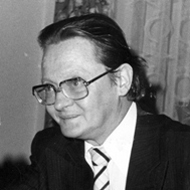Flosman Oldřich
- Year of Birth - Death :
- 1925 - 1998
Biography
The composer Oldrich Flosman studied composition at the Prague Conservatory under Karel Janecek (1944 -1946) and at the Academy of Arts and Music under Pavel Borkovec (1946-1950). He experienced the years of occupation and the happy atmosphere of life in liberated Czechoslovakia as a student and then was a direct participant in the revolutionary changes which decided the socialist orientation of Czechoslovakia. Flosman' s activity in song and dance ensembles was an expression of his social and political commitment. As a member of the Conservatory Ensemble and then the Vit Nejedly Army Artistic Ensemble, he adapted dozens and perhaps hundreds of folk, army, popular and revolutionary songs. He also mastered the technique of compositional work and learned perfect instrumentation. In 1960 he took over the leadership of the Army Artistic Ensemble and introduced many new elements to its sound, above all higher standards in the selection of works and in their rendition in all sections of the ensemble.
Since 1962 Oldrich Flosman devoted himself primarily to composition. Aside from this work, he took part in the activity of the Pragokoncert (Czechoslovak artistic agency), and in 1977 became director of the Copyright Union and held various posts in the Union of Czech Composers and Concert Artists.
Since the beginning of the fifties, Flosman's creation developed from the foundations laid down by both of his teachers; they disciplined his talent and impressed order on his compositional work, without limiting the temperamental immediacy of his nature. Creative discipline is a characteristic feature of Flosman's personality, as was exhibited already in the Girl Partisan dance scene of 1960, or in such later works of rigorous inner organization as Fugues for Piano of 1967, Fugues for Strings of 1970, the Visions of Michelangelo concertant composition for viola and orchestra of 1976 and, in particular, Symphony - Concerto for Piano and Orchestra of 1979.
Flosman has resolved for himself the problem of his attitude to the context of 20th century European music. He entered musical life at a time when compositions by Dmitri Shostakovich and Serge Prokofyev were an example to all who wanted to have their say on topical questions of life and social development. Already in his initial creative period, Flosman was protected from simple external acceptance of some means of expression by his leaning towards Czech folklore. A whole series of Flosman's compositions from that period (Windy Scherzo for flute and harp, the Jesenice Suite for viola and piano, orchestral dances Vrtena, Vrtak, Valcik and others) show that the melodic and rhythmic style of Flosman's compositions was growing from the original folk influences. Elements of vital optimism found their way into the expression of Flosman's music. After 1956 his work gravitated towards greater impact in content and expression: they were not only works with concrete topical social subjects (anti-war cantata Three Halts of 1960, piano sonata Butterflies Do Not Live Here of 1961 inspired by drawings of children from a concentration camp), but also more general compositions (First String Quartet -1956, the Dream of Violin sonata of 1962, First Symphony of 1964, etc.). Latent influences of D. Shostakovich and S. Prokofyev stepped back to the emerging individual talent of the composer; marked themes, often oscillating around the basic tone in half-tone "shells", impressed this work with irreplaceable characteristic intonations.
This formed a direct path to works presenting Flosman as a fully individual creator: Second Concerto for violin and Orchestra, dedicated to Belgian violinist Andre Gertler who rendered it for the first time at the 1973 Prague Spring festival, the aforementioned Visions of Michelangelo written for the outstanding Czech viola player, Lubomir Maly, Symphony - Concerto for piano and orchestra, performed in Prague for the first time by American pianist Leonard Hokanson. His other works, too, show unequivocally that the author is able to cope with any compositional intention, no matter how complex.
Since the beginning of the seventies, Flosman's works have been often performed. Their compositional values and depth of philosophical reflection attracted prominent performers who rendered three of Flosman's concertant compositions (for violin, viola and piano) at the Prague Spring festival. The award of the Klement Gottwald State Prize (1974), decoration For Services to Construction (1975) and honorary title Artist of Merit (1979) were an expression of the strong social response to and official recognition of the engaged social quality of Flosman\'s works.
© 2012-2025 Musicbase.cz
Webdesign & hosting Nux Ltd.
Information about web | Sitemap | RSS | Statistics | CMS
Contact information
Music information center, o.p.s.
tel: 257 312 422 | e-mail: his@musica.cz

